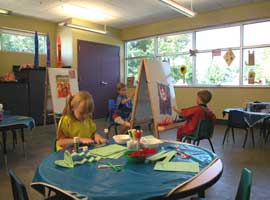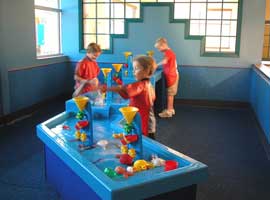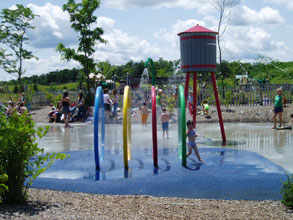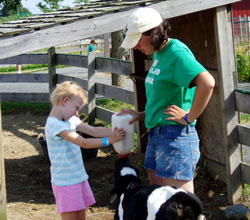
Vol. IV, No. 8, August 2004
- Editor's Corner
- Mothers and Leisure Time
- We've Been in the News
- Beware of Suppliers Promising Plenty
- What's Happening with Children's Edutainment?
- Pal's Sudden Service Drive-Through
- Putt-Putt Celebrates its 50th Anniversary
- Construction Material Price Increases Impact New LBEs
- Families Grab Large Restaurant Market Share
- Kids' Menus Under Major Revision
- Playdate Lawyers
- Get $30 in Books for FREE!
- Cheese Price Increases Impact Profitability
- Busy Dog Days of Summer
- 2005 Educational Seminar Dates Announced
What's Happening with Children's Edutainment?
Children's edutainment centers (CEdCs), also known as children's play and discovery centers, are growing in popularity as a world-wide phenomenon. CEdCs are based on what is referred to as developmentally appropriate play, mostly hands-on, and are designed to appeal to children 8 years old and younger, accompanied by their parents. CEdCs are the antithesis of amusement-based children's entertainment and eatertainment centers, such as Chuck E. Cheese's, which just about every white-collar parent dislikes. Interestingly, much of CEdCs' growth is occurring in non-traditional leisure channels.
For-profit CEdCs continue to be major area of growth for entrepreneurs. However, public park and recreation departments are now looking at CEdCs not only as a way to serve their constituents, but to generate excess revenues, the same as water parks. About half of all American waterparks are owned and operated by municipalities. Many of these water parks generate operating "income" that helps fund other park and recreation programs. Our company was just awarded a contract by the Lake County Parks Department in Lake County, Illinois, to design and develop a 20,000-square-foot indoor and 2-acre outdoor children's edutainment center in its Three Rivers Park. In 2003, our company completed the market and economic feasibility study that helped Lake County underwrite the municipal bonds that will fund the project.


Scenes from the Children's Play & Discovery Center at Paradise
Park,
designed and produced by White Hutchinson.
Children's edutainment centers are also being developed by religious organizations as a part of their outreach and evangelical programs. Our company has been working with Grace Community Bible Church near Houston, Texas, on development of a CEdC, as well as on incorporating children's edutainment concepts into the Sunday school program called Jubilation (learn more at Christian Edutainment).
We were recently retained by a church in northern Virginia to evaluate the development of a CEdC as an outreach program on its new campus. We are also working on the design of an outdoor adventure play garden that is part of the new Meer Family Friendship Center at the Synagogue Campus of Living Judaism near Detroit, Michigan. Friendship Center is being developed to offer special services for children with disabilities, as well as inclusive play and edutainment facilities for children in the area.
Farmers have also been adopting children's edutainment as a new source of income for their farms. Rather than calling their venues children's edutainment or play and discovery centers, the owners call these agritainment facilities children's discovery farms or children's play & discovery farms. Our company has been fortunate to have worked for perhaps the most successful and oldest children's discovery farm, Davis' Farmland in Sterling, Massachusetts, over the past 10 years. We did their original feasibility study and plans, as well as feasibility and designs for expansions over the years. We recently completed a market and economic feasibility study for Johnson's Corner Farm in Medford, New Jersey, for the addition of a children's play & discovery farm to its popular pick-your-own and country store facility.


Davis' Farmland Children's Discovery Farm, a White Hutchinson
client.
CEdCs are not limited to for-profit or income-generating facilities. The non-profit community has also adopted children's edutainment as a way to serve inner-city urban areas. The nonprofit 15,000-square-foot Center for Creative Play, an inclusive play center in Pittsburgh, Pennsylvania, was spearheaded in 1995 by Martha Kaplan, its chief executive, after she was unable to find adequate play facilities for her son, who has serious cognitive and medical challenges. Martha has been successful in funding the center using the concept of social enterprise, which means having a nonprofit conglomerate own the center, with for-profit subsidiaries helping to fund its mission.
CEdCs are also appearing in inner-city community centers. Our company is currently working with a nonprofit social agency in Cleveland, Ohio, that is planning a CEdC as part of a new family and children's center.
The best thing about children's edutainment centers in their various forms is that they bring children opportunities for both indoor and outdoor free play in a society where such opportunities are becoming increasingly scarce. Due to a "culture of fear," parents are more and more afraid to let their children play outside because of crime, ultraviolet rays, insect-born diseases and various forms of pollution. Free play is very important to a child's development, so children's edutainment facilities are filling an important role in today's society.
Vol. IV, No. 8, August 2004
- Editor's Corner
- Mothers and Leisure Time
- We've Been in the News
- Beware of Suppliers Promising Plenty
- What's Happening with Children's Edutainment?
- Pal's Sudden Service Drive-Through
- Putt-Putt Celebrates its 50th Anniversary
- Construction Material Price Increases Impact New LBEs
- Families Grab Large Restaurant Market Share
- Kids' Menus Under Major Revision
- Playdate Lawyers
- Get $30 in Books for FREE!
- Cheese Price Increases Impact Profitability
- Busy Dog Days of Summer
- 2005 Educational Seminar Dates Announced


